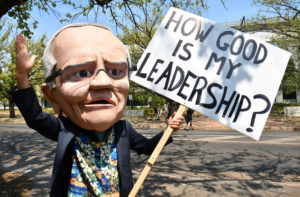Australia’s election may have kicked off a little over a week ago, but aside from the TV pundits giddy at the prospect of filling airtime with banal updates of the location of the Prime Minister’s plane, it’s hard to find much genuine excitement for the main parties, or belief that they will address the country’s problems. As one voter put it, the choice is between “two bad eggs”.
In the blue corner, we have the conservative Coalition government, led by the current Prime Minister, Scott Morrison. In power for nine years, the Coalition’s record isn’t exactly inspiring. There’s the harsh immigration policy of indefinitely locking up asylum seekers in camps across the Pacific that even Donald Trump found objectionable. There’s the $144 billion tax cut, 80% of which benefitted the top 20% of income earners. There’s the ongoing internal warfare over climate policy, which has resulted in emissions going up and no credible plan for decarbonising one of the world’s most fossil fuel intensive economies. There’s the billions wasted on defence equipment, including submarines that won’t surface until 2040, ships that are too slow, fighter jets that don’t fly, and tanks that the country doesn’t need. Meanwhile, wage growth is the weakest it’s been since the Thirties, inequality has increased, and housing in increasingly out of reach for those without rich parents.
Rather than address any of these issues, the Coalition has instead spent its time in office attacking enemies and rewarding friends. In regards to the former, the unions and universities have been its preferred targets, while the government has distinguished itself by outsourcing everything — from service delivery to policy design — to favoured private providers, with spending on consultants more than doubling during its tenure in power. Even then, it has failed to deliver the industrial relations reforms demanded by big business, or the religious freedom laws sought by the churches, simply giving up rather than trying to negotiate them through Parliament. All this tells the tale of a government lacking organic links with society, happy enough to rule the void between citizens and the state by simply remaining in power and kicking problems down the road.
The one area where the government does claim success is its management of the pandemic. Certainly, by international standards, Australia’s Covid-19 death toll was low, and the government provided unprecedented economic support to people losing their jobs and businesses struggling to stay afloat during lockdowns. But while the economy has bounced back impressively, with respectable growth rates and record low levels of unemployment, the pandemic response was also marred by multiple failures of the government’s making. These included a botched vaccine roll-out which prolonged lockdowns around the country, an aged care system which failed to protect the most vulnerable, and a failure to prepare a rapid testing regime for when the country opened up during the Omicron wave.
In any case, even as the government tries to brush over these failures, the reality is that the public has moved on. Covid-19 isn’t a major election issue; instead voters are concerned with rising inflation and cost of living, the state of the health system, climate change, stagnating wages and housing affordability. On all of these issues, the Coalition has done little, and the public know it. Only 35% rate its performance as good or very good.
Yet the polls show that the government and opposition are virtually tied, with neither party’s primary vote currently high enough to govern alone and a hung parliament a real possibility. Why is this?
Enter the Australian Labor Party (ALP). The centre-left party — out of office for 20 of the last 26 years — is still haunted by losing the “unlosable election” in 2019 against a Coalition government riven with divisions and tanking in the polls, which had only recently installed Morrison as leader in a Hail Mary play to save the furniture. During the campaign, the ALP put forward a relatively ambitious Third Way agenda, proposing to wind back tax cuts for the rich, close loopholes for investors and speculators to increase housing affordability, ramp up spending on social services, health and education, and commit the country to modest action on climate change.
But on election night, it was Morrison who pulled off a “miracle” win for the Coalition, thanks in no small part to low and middle-income voters who would have most benefited from Labor’s redistributive agenda. The reasons for this, according to a post-mortem internal review, were Labor’s deeply unpopular leader, Bill Shorten, the party’s inability to communicate its diffuse policy agenda, and a highly effective scare campaign from the Coalition that Labor represented “the Bill that Australia can’t afford”.
But the rot ran deeper, with the campaign exposing the void between the ALP and society, with its once-strong links to the union movement, community organisations and civil society eroded by decades of Third Way centrism. In such a context, it’s difficult for a Left-wing party to offer an ambitious agenda to a sceptical and depoliticised electorate more concerned with maintaining slipping living standards. Faced with an agenda full of promises made by a party they didn’t really know or trust, these “Quiet Australians”, as Morrison called them, chose to stick with the devil they knew.
In response, rather than trying to reconnect with society, the ALP’s lesson from 2019 was to abandon having an agenda altogether. It junked most of its key policies, and spent the past three years adopting a strategy of “bitch and fold”: criticising government policies in Parliament only to vote them through for fear of becoming the target of a new scare campaign. The end result is a party scared of its own shadow, with a small-target agenda that apes most of the government’s policies while promising to do them better, coupled with small spending commitments in areas such as health, childcare and education.
Absent a policy agenda, the ALP has instead framed the election as a contest on personality and competence between Albanese and Morrison. Certainly, they’ve got plenty to work with. Recently leaked messages from Morrison’s own party have revealed his colleagues think he is “a fraud”, “a psycho”, “a horrible, horrible man”, and “a hypocrite and a lair”. Likewise, his cosplay as a scruffy suburban dad has increasingly worn thin with the electorate, with voters describing him as “smirking, unkempt, immature and dishonest”. After his vaccine roll-out failure, and his shirking of responsibility during the Black Summer bushfires of 2019 and recent devastating floods in Queensland and New South Wales, Morrison’s reputation is of a leader who is always “a day late and a dollar short”. In this context, he makes an easy target.
Yet the problem for the ALP is that two can play this game. Labor’s leader, Anthony Albanese, is a party-machine man who, despite spending 26 years in Parliament (six of them as a minister in the previous Labor government), remains an unknown quantity to the electorate. Focus groups describe him as “dull” and identify the fact that he “wasn’t Bill Shorten” as his only strength. Likewise, he had a terrible start to the campaign, unable to remember key economic data such as the unemployment and interest rates. So much for competence. The Coalition could scarcely believe its luck, quickly rolling out another scare campaign, warning voters that “it won’t be easy under Albanese”.
In short, the upcoming Australian election is shaping up to be a contest over personality and competence between two parties led by men who exhibit neither. Nevertheless, both seem happy to fight on this terrain to compensate for the lack of a political agenda, and to paper over the void between their parties and the rest of society. In this context, it’s not surprising there’s little enthusiasm among voters, with one describing the election as “like going to a restaurant and you look at the menu and there is nothing you are really desperate to eat”. Faced with nothing appetising on the menu, the voters might just end up ordering the same as last time.
Disclaimer
Some of the posts we share are controversial and we do not necessarily agree with them in the whole extend. Sometimes we agree with the content or part of it but we do not agree with the narration or language. Nevertheless we find them somehow interesting, valuable and/or informative or we share them, because we strongly believe in freedom of speech, free press and journalism. We strongly encourage you to have a critical approach to all the content, do your own research and analysis to build your own opinion.
We would be glad to have your feedback.
Source: UnHerd Read the original article here: https://unherd.com




